|
|
|
Sort Order |
|
|
|
Items / Page
|
|
|
|
|
|
|
| Srl | Item |
| 1 |
ID:
131427


|
|
|
|
|
| Publication |
2014.
|
| Summary/Abstract |
Adolf Hitler's experiences during the First World War have been much discussed, with historians tending to concentrate on his involvement in the fighting and the operational lessons he later claimed to draw. Much less has been written about the impact of the war on his world view, though recent work has tended to suggest that his paranoid anti-Semitism was not yet visible during the conflict. Drawing on this latest research, but also on newly discovered sources and previously underused material, the author shows that Hitler's main preoccupation during the war and its immediate aftermath was the overwhelming power of Great Britain and its American ally. He associated these two powers with the alleged international Jewish economic conspiracy that had crushed the German empire. Hitler's anti-Semitism thus originated in an anti-capitalist, rather than anti-communist, discourse. He blamed Britain and the US for the rigours of the Versailles peace settlement, a moment which was far more politically formative for him than the experience of defeat itself. His encounter with American soldiers in the summer of 1918 also marked his first engagement with the global power of the United States and the start of a belief in the demographic weakness of the German empire which inspired his plans for Lebensraum in the east.
|
|
|
|
|
|
|
|
|
|
|
|
|
|
|
|
| 2 |
ID:
154052
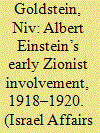

|
|
|
|
|
| Summary/Abstract |
This article presents the very beginning of Albert Einstein’s involvement on behalf of the Zionist movement. Although he was familiar with Zionist activists, it was only World War I and the rabid anti-Semitism attending it that led him to rediscover his affiliation with the Jewish people and to subscribe to the Zionist solution to their misery. Einstein tried to combine his support for the national Zionist ideals with the universal worldview to which he adhered from time immemorial, gradually coming to support establishment of the national home in Palestine as a solution for ‘The Jewish Problem’.
|
|
|
|
|
|
|
|
|
|
|
|
|
|
|
|
| 3 |
ID:
072554
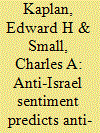

|
|
|
|
|
| Publication |
2006.
|
| Summary/Abstract |
In the discourse surrounding the Israeli-Palestinian conflict, extreme criticisms of Israel (e.g., Israel is an apartheidstate,theIsraelDefenseForcesdeliberatelytargetPalestiniancivilians),coupled with extreme policy proposals (e.g., boycott of Israeli academics and institutions, divest from companies doing business with Israel), have sparked counterclaims that such criticisms are anti-Semitic (for only Israel is singled out). The research in this article shines a different, statistical light on this question: based on a survey of 500 citizens in each of 10 European countries, the authors ask whether those individuals with extreme anti-Israel views are more likely to be anti-Semitic. Even after controlling for numerous potentially confounding factors, they find that anti-Israel sentiment consistently predicts the probability that an individual is anti-Semitic, with the likelihood of measured anti-Semitism increasing with the extent of anti-Israel sentiment observed.
|
|
|
|
|
|
|
|
|
|
|
|
|
|
|
|
| 4 |
ID:
077863
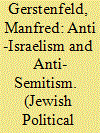

|
|
|
|
|
| Publication |
2007.
|
| Summary/Abstract |
Anti-Semitism's core theme is that Jews embody absolute evil. It has been propagated intensely for many centuries. This extreme fallacy and its principal submotifs have remained largely the same over the ages. Their representation, however, has evolved according to circumstances. The three main permutations of the core theme are religious anti-Semitism-one might call it more precisely anti-Judaism, ethnic (racist) anti-Semitism, and anti-Israelism or anti-Zionism.
These three permutations have a number of common characteristics. There is an ongoing, powerful promotion of a discourse of Jew-hatred. The main motif of the Jew constituting absolute evil manifests itself according to the prevailing worldviews at a given time. Verbal or physical attacks are common against both Jews and Israelis. Jews and nowadays Israel are judged by standards applied to them but not to others. In its extreme form, the anti-Semitic process has three stages: demonization, isolation, and elimination.
The anti-Semitic character of anti-Israelism can be proved through the analysis of cartoons, opinion survey findings, statistical analysis, and semantics. During the summer 2006 war in Lebanon, further proof emerged that anti-Semitism and anti-Israelism go hand in hand
|
|
|
|
|
|
|
|
|
|
|
|
|
|
|
|
| 5 |
ID:
173271
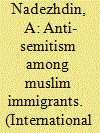

|
|
|
|
|
| Summary/Abstract |
EXPERTS have for years been pointing to mounting xenophobic, anti-immigrant, and radical sentiments among the population of Europe. However, recently it is not only refugees and economic migrants from the Middle East and North Africa (MENA region) who have been facing hostility but also Jews who have lived in Europe permanently and have been integrated into European society. Usually, European anti-Semitism has been blamed on right-wing extremists and radicals, especially those in Hungary and Poland.1 There occur random instances of trivial anti-Semitic behavior, for example at school or in companies, that are not investigated or taken into account in police statistics.
|
|
|
|
|
|
|
|
|
|
|
|
|
|
|
|
| 6 |
ID:
178892
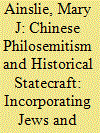

|
|
|
|
|
| Summary/Abstract |
Philosemitism – the idealization of Jews and Israel – and Chinese-Jewish history function as a platform of soft power for growing China–Israel relations and as a means to bolster Chinese nationalism. Given the Chinese Communist Party's current positioning of China as a globally dominant power as part of the Belt and Road Initiative, this article re-examines the contemporary incarnation of philosemitism in China as part of a civilizationist narrative designed to position China as globally central and superior. This not only places heavy emphasis upon Jewish racial stereotypes and erases genuine historical Jewish voices but it also ignores evidence of anti-Semitic beliefs in China.
|
|
|
|
|
|
|
|
|
|
|
|
|
|
|
|
| 7 |
ID:
188239
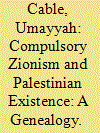

|
|
|
|
|
| Summary/Abstract |
This essay offers a genealogy of the phrase “compulsory Zionism” in order to illuminate its vexed and contradictory intellectual foundations, the ethical and political stakes of the discourse surrounding the phrase, and its accompanying racial project. Scholars of late have taken up the use of this phrase to signal how “common-sense” knowledge about Palestine and Israel is naturalized in ways that privilege Israel and subjugate Palestinian existence. However, I argue that the phrase is also useful for understanding how Palestine solidarity politics are micromanaged within transnational leftist social justice movements and academia.
|
|
|
|
|
|
|
|
|
|
|
|
|
|
|
|
| 8 |
ID:
163851
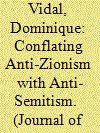

|
|
|
|
|
| Summary/Abstract |
This essay argues that in conflating anti-Zionism with anti-Semitism, France’s president, Emmanuel Macron, has been mistaken on two counts: one, historical, since a majority of Jews have historically rejected the Zionist project, with the majority of them living outside Israel, and hundreds of thousands of Israeli citizens choosing to do the same; and the second, political, as it has opened the way for the Conseil représentatif des institutions juives de France (CRIF) to demand legislation banning anti-Zionism, in the same vein as earlier efforts to criminalize the French Boycott, Divestment and Sanctions (BDS) movement. France’s juridical foundation is strong, however, and it does not allow for the criminalization of speech. The Declaration of the Rights of Man and the Citizen (1789), the Constitution of the Fifth Republic (1958), and the European Convention on Human Rights (1953) all stand as safeguards of the fundamental right to freedom of expression—at least for the time being.
|
|
|
|
|
|
|
|
|
|
|
|
|
|
|
|
| 9 |
ID:
124356


|
|
|
|
|
| Publication |
2012.
|
| Summary/Abstract |
The media in France show an inordinate interest in the Middle East and more specifically in the Palestinian issue and Israel. Not a day passes without a news item, an article, and several blog posts on the subject. Each year ushers in a new crop of essays on this topic, while other weighty matters, such as human rights in China or the neverending food crisis and endemic corruption in Africa get short shrift. The subject never fails to fascinate the public. Writing about the settlements or the blockade of Gaza will prompt hundreds of talkbacks, a fact well known to editors of websites such as Rue891, which rely heavily on advertising to survive.
|
|
|
|
|
|
|
|
|
|
|
|
|
|
|
|
| 10 |
ID:
060868
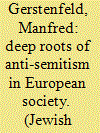

|
|
|
| 11 |
ID:
172908
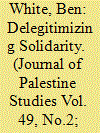

|
|
|
|
|
| Summary/Abstract |
In response to growing Palestine solidarity activism globally—and particularly in countries that have been traditional allies of Israel—the Israeli government has launched a well-resourced campaign to undermine such efforts. A key element of this campaign consists in equating Palestine advocacy; the Boycott, Divestment, Sanctions (BDS) movement; and anti-Zionism with anti-Semitism. The concerted effort to delegitimize solidarity with the Palestinians is taking place even as genuine anti-Semitism is on the rise, thanks to the resurgent white nationalism of the Far Right in Europe and North America—political forces that Israel is harnessing to help shield from scrutiny and accountability its apartheid policies toward Palestinians, both citizens of the state as well as those under military rule. In its efforts to conflate anti-Zionism with anti-Semitism, the Israeli government is assisted by non-state organizations that nonetheless enjoy close ties with the state and its agencies.
|
|
|
|
|
|
|
|
|
|
|
|
|
|
|
|
| 12 |
ID:
193282
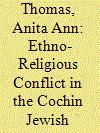

|
|
|
|
|
| Summary/Abstract |
The migration of Cochin Jews from Kerala to the promised land of Israel can be traced back to the 1950s. Though the population of the Jewish community in Cochin is reduced to less than ten in number today, their past cannot be erased from Kerala history, especially the ethnic life of the Malabari Jewish community. Apart from folk songs and archaeological findings, Ruby Daniel, a Malabari Jewish woman, and the renowned ethnographer Barbara C. Johnson left behind an essential source of ethnographic data to explore the social life of Jew town. The significant ethnic life of the Malabari Jewish community and their attempt to claim and confirm their identity as the mainstream Cochin Jewish community continues even today among the remaining Malabari Jews in the Jew town. This article attempts to analyze the ethnic and social life of the Malabari Jewish community and the Cochin Jewish community through the auto-ethnographical narrative of Ruby Daniel.
|
|
|
|
|
|
|
|
|
|
|
|
|
|
|
|
| 13 |
ID:
176168
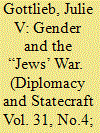

|
|
|
|
|
| Summary/Abstract |
The study of the gender complexion of pacifist movements has greatly expanded in recent decades, a product of the convergence of the new international history and study of transnationalism with the ever firmer rooting of women’s and gender history. Yet the study of pacifism in wartime has received less attention, and that of unlikelier pacifists emerging from the far Right even less. The British Union of Fascists and National Socialists [BU] launched its ‘Peace Campaign’ in 1938, and women fascists played leading roles on both practical and symbolic levels. It culminated in the launch of their own Women’s Peace Campaign in 1940, relying heavily on tropes of women’s innate pacifism and, more narrowly, domestic concerns in the home and on the home front. The BU’s policy shift from para-militarism to a militant non-interventionism and a racially motivated isolationism was more accurately an anti-war and stop-the-war campaign. Even before 1939, they dubbed the world war the ‘Jews’ War’, and women contributed in equal measure to the xenophobic and racialist charge of the BU’s campaign. However, situating anti-war fascist women amongst other women’s groups who organised to oppose the Second World War, in particularly in the Peace Pledge Union – which had launched a Women’s Peace Campaign in December 1939 – exposes the variegated nature of British women’s activism and attitudes from the high water mark of appeasement to the end of the Phoney War.
|
|
|
|
|
|
|
|
|
|
|
|
|
|
|
|
| 14 |
ID:
151822
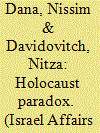

|
|
|
|
|
| Summary/Abstract |
While Holocaust denial existed even during the Holocaust itself, this phenomenon has substantially expanded and diversified over the past decades. This ranged from the advent of technologies that shifted the debate to new platforms and forums, to Israel’s comparison to Nazi Germany, to Islamist-driven Holocaust denial and anti-Semitism on European streets. Paradoxically, concurrently with the intensification of Holocaust denial by Arabs and Muslims, they have made massive use of Holocaust symbols, language, and discourse in their national struggle. This article presents this paradox ‒ Arab Holocaust denial and Holocaust memory manipulation ‒ in an attempt to identify ways and means to address this phenomenon against the backdrop of the Arab‒Israeli conflict.
|
|
|
|
|
|
|
|
|
|
|
|
|
|
|
|
| 15 |
ID:
188231
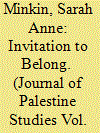

|
|
|
|
|
| Summary/Abstract |
This essay takes as its starting place the “present absentee” status of Palestinians in U.S. and Jewish discourse and engagement with Israel/Palestine. Ethnographic fieldwork in Jewish American communities demonstrates practices that reiterate a dynamic of Jewish belonging against the presence of Palestinian absence. The essay explores different initiatives to challenge this systemic exclusion of Palestinians, including public programs that amplify Palestinian voices and normalize hearing Palestinians as experts in their own lives and an experimental study group with Jewish American leaders that centers Palestinian perspectives in an effort to cultivate radical empathy. Insights gained in these initiatives point to the importance of articulating fuller visions of community and belonging in engagement with Israel/Palestine.
|
|
|
|
|
|
|
|
|
|
|
|
|
|
|
|
| 16 |
ID:
154269
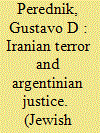

|
|
|
| 17 |
ID:
139952
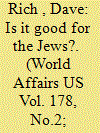

|
|
|
|
|
| Summary/Abstract |
You can look at the jihadist murders of Jews in Brussels, Paris, and the Danish capital of Copenhagen over the past 12 months, and in Toulouse, in southern France, three years ago, and at the murder of Ilan Halimi in Paris in 2006, and conclude that Europe generally, and France in particular, has a problem with homicidal anti-Semitism.
|
|
|
|
|
|
|
|
|
|
|
|
|
|
|
|
| 18 |
ID:
185267
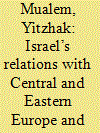

|
|
|
|
|
| Summary/Abstract |
This article examines the role of Jewish Diaspora considerations in Prime Minister Benjamin Netanyahu’s policy towards the states of Central and Eastern Europe. Israel has traditionally sought to attain both its state-centred national goals and those of the Jewish Diaspora. Under the Netanyahu governments (2009–21) a major change took place whereby the Diaspora’s existence was viewed as dependent on Israel’s continued survival and success; hence only a strong Israel can help the Diaspora. The security and wellbeing of the Jewish Diaspora thus remains a central Israeli goal, but it is to be pursued via Israel’s strengthening on the one hand, and the deepening of Jewish identity and awareness among Diaspora Jews, on the other.
|
|
|
|
|
|
|
|
|
|
|
|
|
|
|
|
| 19 |
ID:
145623
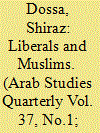

|
|
|
|
|
| Summary/Abstract |
The liberal claim to decency is flimsy. In fact, the liberal norm is indecency. The Muslim case is symptomatic of this reality. The suffering of Muslims is extensive in liberal locales. The threat to Muslim security is intrinsic in liberal theory. It is the liberal genre of exclusion. In this article, I unravel anti-Muslim antipathy in Kant, Mill, and Montesquieu (KMM). I dissect their specious claims about the Muslims and the Orient. I stress KMM's formative influence on liberal academe. I conclude with the criticism of liberal Jewish attacks on Muslims/Arabs/Palestinians.
|
|
|
|
|
|
|
|
|
|
|
|
|
|
|
|
| 20 |
ID:
141360


|
|
|
|
|
| Summary/Abstract |
Claims that criticism of Israel stems from anti-Semitism has a history in Israel, and can be cynically manipulated for political ends.
|
|
|
|
|
|
|
|
|
|
|
|
|
|
|
|
|
|
|
|
|